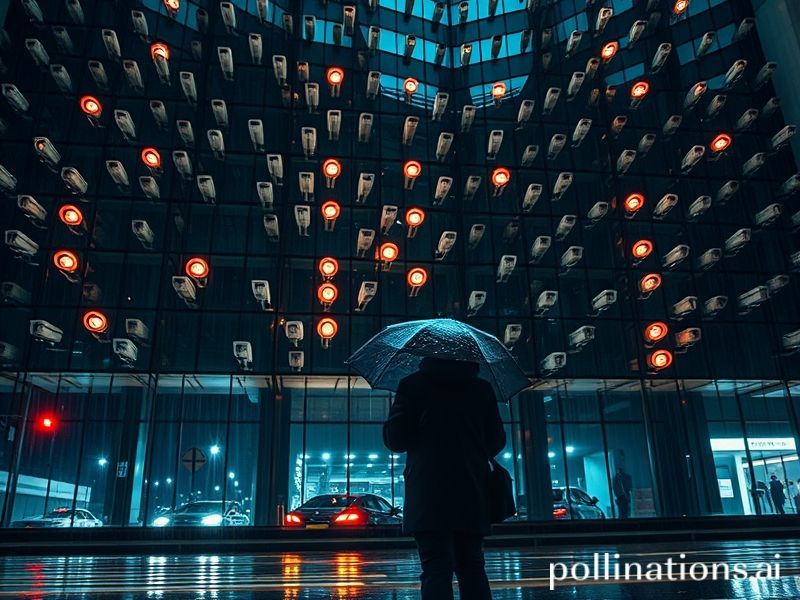Smile, Earthling: How the Planet Turned Orwell’s Nightmare into a Viral Influencer Campaign
Big Brother Is Streaming—And He’s Got 8K Resolution
By the time you finish this sentence, roughly 1.3 petabytes of face-recognition data will be filed away in places you’ve never heard of, with names like “Project Lavender Mist” or “Operation Helpful Walrus.” From Singapore’s lamp posts that scold jaywalkers in real time to Detroit’s “Green Light” cameras that tattle on anyone who loiters near a liquor store for more than 12 seconds, the 21st-century Panopticon has dispensed with the dusty Orwellian binoculars and upgraded to a Dolby Atmos surround-sound dystopia. The twist? Most of us queued up for the installation appointment and even tipped the technician.
Consider the global scoreboard. In the People’s Republic of China, the social-credit system gamifies obedience like a particularly vindictive airline loyalty program—Jaywalk once, lose 50 “citizen points” and discover your dating-app radius has shrunk to the nearest bus shelter. Meanwhile, the United Kingdom—birthplace of the original Big Brother—has quietly embedded facial-recognition cameras in London’s Soho, because nothing says “post-Brexit cool” like a bobby who can match your mug to a database before you’ve finished your flat white. Over in the United States, Amazon’s Ring doorbells have turned suburban cul-de-sacs into crowdsourced surveillance fiefdoms, where neighbors rate one another’s trash-can etiquette with the same fervor they once reserved for apple-pie recipes. And in Delhi, the Aadhaar biometric ID links the eyeballs of 1.3 billion people to everything from ration cards to Tinder verification—swipe right on the future, but don’t blink.
The international implications are deliciously ironic. Nations that used to accuse one another of espionage now attend the same trade expos to shop for AI-enabled crowd-mood analytics. Last year’s Security China Expo in Beijing featured a booth where a grinning salesman demoed software that detects “emotional anomalies” in Uighur dialects; two stalls down, a French startup offered the same algorithmic nosiness to predict which metro passengers might be carrying baguettes of mass destruction. The global supply chain of surveillance is so intertwined that a camera casing manufactured in Shenzhen contains chips designed in Israel, software written in Canada, and an end-user license agreement nobody has ever finished reading.
Of course, every empire needs a moral fig leaf. The marketing brochures—translated into 47 languages—promise “safety,” “efficiency,” and “frictionless living.” In Nairobi, traffic cameras claim to reduce gridlock by publicly shaming matatu drivers with SMS alerts to their mothers. In Stockholm, sensors track how often office workers take coffee breaks, allegedly to “optimize workplace happiness,” a phrase that sounds infinitely more sinister when spoken aloud. And in Dubai, police hover-bikes patrol the skies because apparently the only thing more reassuring than being watched is being watched from a carbon-fiber mosquito.
The broader significance is that Big Brother has subcontracted. He no longer needs an austere Ministry of Love; he’s perfectly happy being a patchwork of start-ups, city councils, and that one neighbor who keeps insisting, “If you’re not doing anything wrong, why worry?” The result is a planetary Truman Show where we are simultaneously audience, actor, and unpaid extra. Our smartphones ping us with reminders to smile for the municipal happiness index, while our smart fridges tattletale on late-night ice-cream binges to our health-insurance apps. Somewhere in a server farm the size of Liechtenstein, an algorithm has already predicted you’ll click away from this article in 3…2…1—
Still here? Congratulations. The system just upgraded your loyalty tier to “Compliant Reader, Tier III.” Your reward is another targeted ad for noise-canceling headphones—perfect for tuning out the gentle hum of a million whirring lenses.
In the end, Big Brother isn’t watching; he’s crowdsourcing. He’s outsourced the watching to us, and we’ve turned it into a lifestyle brand. The revolution will not be televised; it will be livestreamed, monetized, and available for replay with optional subtitles in 17 languages. Smile—you’re trending.







